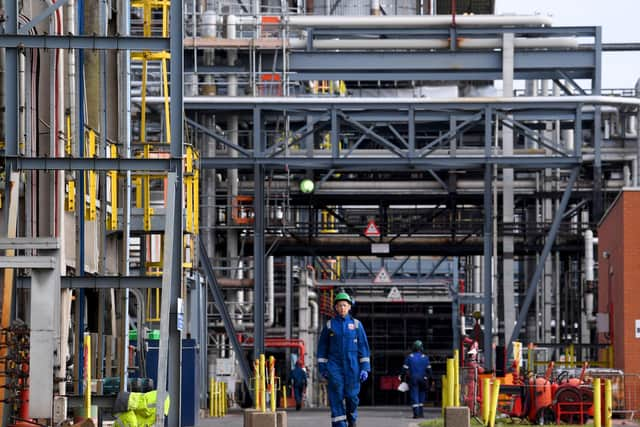Oil refinery Phillips 66 backs £60m net zero training centre plan to tackle construction skill shortages
The US giant, which runs a refinery in South Killingholme, North Lincolnshire, is backing plans for the development of a £60m state-of-the-art facility in Stallingborough near Grimsby which will be known as a national net zero training centre.
The work entails a substantial expansion of the existing Centre for Assessment for Technical Competence Humber (CATCH) facility which is backed by a variety of major industrial companies based in the region.
Advertisement
Hide AdAdvertisement
Hide AdFollowing initial funding support from key industrial sponsors, and CATCH members, Phillips 66 Limited, Harbour Energy, and VPI Power, CATCH has developed plans for the future training centre expansion needed to deliver 1,000 new learners per year by 2029.


A series of proposed net zero projects across the Humber region in the coming years are expected to require 20,000 workers
Chris Gilbert, decarbonisation lead for the refinery, told The Yorkshire Post that the ongoing Hinkley Point construction project in Somerset has underlined the need to train more workers, while schemes designed to help industries reach net zero will soon require substantial manpower.
He said: “We are seeing with Hinkley Point it is consuming a lot of available resource. With the Humber Zero carbon capture plan we have a challenges of getting workers.
Advertisement
Hide AdAdvertisement
Hide Ad“At the moment, training for apprentices is done in Stallingborough. Currently have just over 100 a year, we are looking with Harbour and VPI to increase ten-fold from 100 to 1,000 a year.
“That is a gamechanger and would be good for the area. The start of that is happening.”
Refinery manager Paul Fursey added that the company is keen to show it is a positive career choice for young people.
“Yes we are an oil refinery but we are starting to replace crude oil with renewable feedstocks, we are making speciality carbon for electric vehicles - it is time of change and transition,” he said.
Advertisement
Hide AdAdvertisement
Hide Ad"Young people should be looking at this as an exciting opportunity to get into the industry rather than looking it as a dying industry. We are not a sunset industry, we believe in change. You can’t ‘just stop oil’ because it is embedded in everything. We need to be part of the process of change and we want to be.
“We want to attract people to come here and work here but they need a pathway to get here.”
Subject to further partner engagement and planning permission, the new facility is planned to house a national net zero conference and learning centre, bespoke classrooms and workshops for electrical, instrumentation, mechanical technical skills, a welding and fabrication hub with an impressive 160 welding bays, and a UK first of kind outdoor Process Unit Training Module to enable a real process site experience in a safe environment for all trade skills.
In addition, provisions cater for enhanced car parking facilities and a dedicated CATCH regional bus infrastructure to help get talented apprentices to the site from across the Lincolnshire and Yorkshire regions.
Advertisement
Hide AdAdvertisement
Hide Ad"Our phased strategy ensures a sustainable expansion of apprenticeship numbers, targeting the training of 1,000 apprentices annually by 2029," David Talbot, CATCH CEO said. "The backbone of this initiative's success will be the support from the industrial supply chain.”